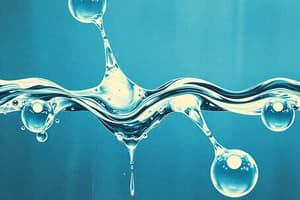Podcast
Questions and Answers
What enables water to form polar associations with other charged molecules?
What enables water to form polar associations with other charged molecules?
Why can water dissolve a large number of substances?
Why can water dissolve a large number of substances?
What type of bond is formed between a δ+ hydrogen and a δ– oxygen in water molecules?
What type of bond is formed between a δ+ hydrogen and a δ– oxygen in water molecules?
Why is water commonly referred to as the universal solvent?
Why is water commonly referred to as the universal solvent?
Signup and view all the answers
What property of oxygen contributes to the polarity of water?
What property of oxygen contributes to the polarity of water?
Signup and view all the answers
What type of bond can water form with other water molecules?
What type of bond can water form with other water molecules?
Signup and view all the answers
Which substances are considered hydrophilic?
Which substances are considered hydrophilic?
Signup and view all the answers
What property of water results in a relatively high surface tension?
What property of water results in a relatively high surface tension?
Signup and view all the answers
What allows water to absorb large amounts of heat energy before changing state?
What allows water to absorb large amounts of heat energy before changing state?
Signup and view all the answers
Why does ice float on water?
Why does ice float on water?
Signup and view all the answers
What thermal property makes water an effective coolant?
What thermal property makes water an effective coolant?
Signup and view all the answers
Study Notes
Water's Polarity and Solubility
- Water can form polar associations with other charged molecules due to its slight positive charge on hydrogen atoms (δ+) and slight negative charge on oxygen atoms (δ–).
- Water's polarity enables it to dissolve a large number of substances, earning it the title of "universal solvent".
- The bond formed between the δ+ hydrogen and δ– oxygen in water molecules is a hydrogen bond, a type of intermolecular force.
Water's Properties
- Oxygen's high electronegativity contributes to the polarity of water.
- Water can form hydrogen bonds with other water molecules, allowing for strong intermolecular attractions.
- Hydrophilic substances are those that have an affinity for water, often containing charged or polar groups.
Water's Surface Tension and Thermal Properties
- Water's high surface tension results from the strong hydrogen bonds between molecules at the surface.
- Water's high specific heat capacity allows it to absorb large amounts of heat energy before changing state.
- Water's high specific heat capacity also makes it an effective coolant, as it can absorb and release heat energy slowly.
Water's Anomalous Behavior
- Ice floats on water because the hydrogen bonds in solid ice are arranged in a way that creates a less dense crystal structure than liquid water.
- Water's unusual thermal properties, such as its high specific heat capacity, make it an effective coolant and allow it to play a crucial role in many biological and geological processes.
Studying That Suits You
Use AI to generate personalized quizzes and flashcards to suit your learning preferences.
Description
Test your knowledge on the structure of water and its ability to form hydrogen bonds with other molecules. Learn about the dipolarity of water, hydrogen bonding, and the electronegativity of oxygen.




